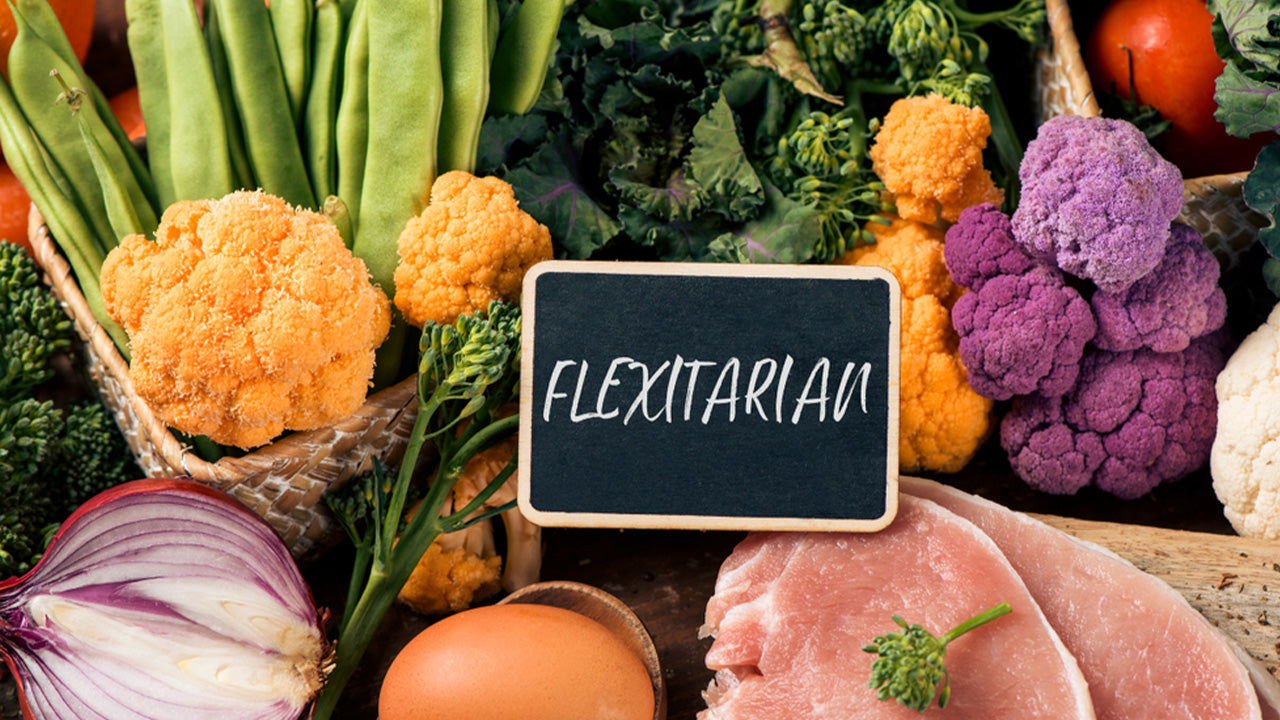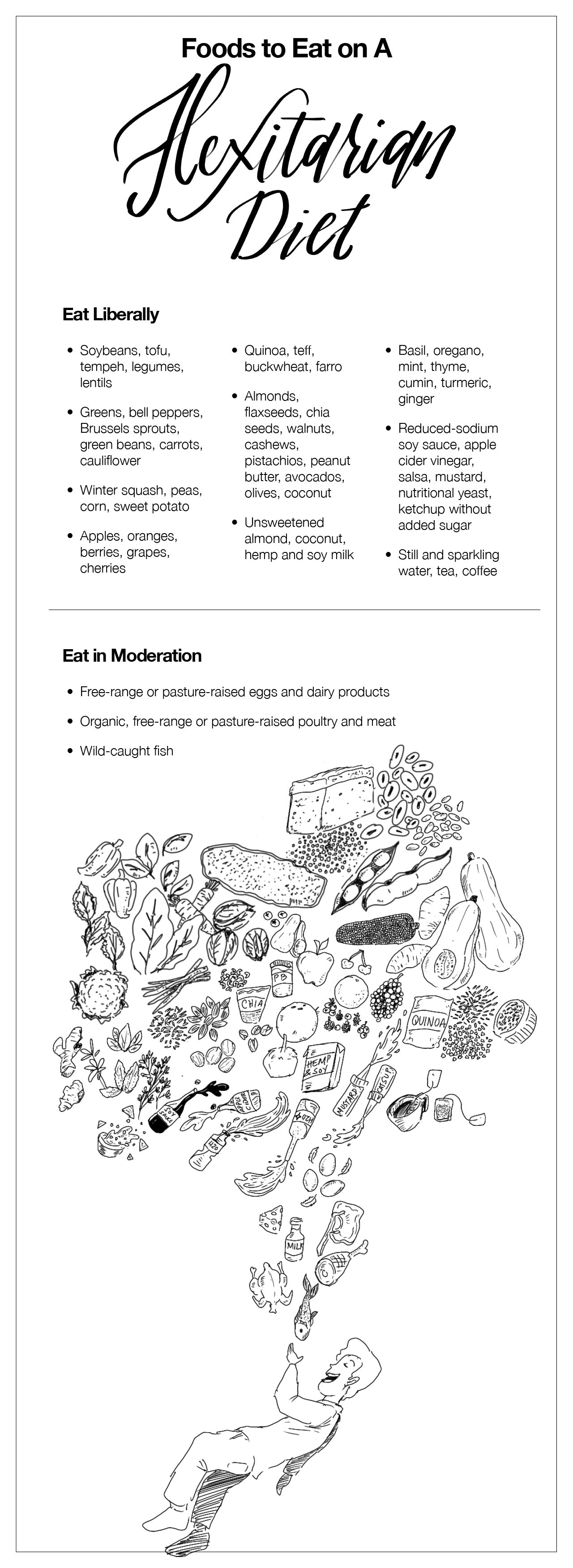Is the Flexibility of the Flexitarian Diet a Fit for You?
 By: by Amino Science
By: by Amino Science

U.S. News & World Reports 2020 rankings are out, and the Flexitarian Diet took home some honors:
- #2 in Best Diet Overall
- #2 in Best Diabetes Diet
- #2 in Easiest Diet to Follow
- #2 in Best Plant-Based Diet
- #3 in Best Diet for Healthy Eating
In case you’re wondering, it was routinely beat out by the Mediterranean Diet, a diet that emphasizes vegetables, fruits, seeds, nuts, legumes, whole grains, potatoes, herbs, spices, breads, seafood, and extra virgin olive oil, and calls for only moderate consumption of poultry, eggs, and dairy alongside the avoidance of sugary beverages, processed foods, and refined grains and oils.
Compared to the Mediterranean diet, which was popularized in the 1960s, the Flexitarian Diet has had just a little over a decade to make a name for itself. Coined by dietitian Dawn Jackson Blatner in her book by the same name, the Flexitarian Diet brings together vegetarianism and flexibility for an eating plan that appeals to individuals looking to eat healthier and lose weight without having to entirely forego meat and animal products. Let’s find out if the flexitarian lifestyle is a fit for you!
Flexitarian Diet Principles
At its core, the Flexitarian Diet is, well, flexible. If follows some basic guidelines:
- Vegetables, fruits, whole grains, legumes, and protein from plant-based sources make up the bulk of your diet
- Meat and animal products can be occasionally consumed
- Whole foods are recommended and processed and refined foods are off limits
- Added sugars and sweets should be limited
- Exercise is encouraged (30 minutes a day of moderate-intensity exercise 5 days a week or 20 minutes a day of high-intensity exercise 3 days a week)
It differs from pescatarian or omnivore diets in that it strives to significantly lower your meat consumption while increasing your intake of plant-based foods.
The Flexitarian Diet really is that simple—fill your plate up with more veggies and fewer animal products. Reproportion your plate to 50% fruits and vegetables, 25% whole grains, and 25% meat, poultry, or fish.
Or follow Blatner’s beginner, advanced, expert markers:
- Beginner flexitarian: Go meatless 2 days a week (6-8 meatless meals out of 21 total meals, or 26 ounces of meat or fish a week).
- Advanced flexitarian: Go meatless 3-4 days a week (9-14 meatless meals out of 21 total meals, or 18 ounces of meat a week).
- Expert flexitarian: Go meatless 5 or more days a week (15+ meatless meals out of 21 total meals, or 9 ounces of meat a week).
In her book, The Flexitarian Diet: The Mostly Vegetarian Way to Lose Weight, Be Healthier, Prevent Disease, and Add Years to Your Life, Blatner also suggests eating a 300-calorie breakfast, 400-calorie lunch, and 500-calorie dinner with two 150-calorie snacks throughout the day for weight loss, but there is no hard and fast number of calories to follow when it comes to the Flexitarian diet.
Who Is the Flexitarian Diet For?
The Flexitarian Diet is for anyone who wants to eat a healthy diet and lower their risk for chronic disease. Those interested in a vegetarian or vegan diet who aren’t quite ready to give up meat and animal byproducts for good naturally gravitate toward a Flexitarian Diet. It’s also a great compromise if you’ve tried eating a solely plant-based diet but suffered from nutritional deficiencies. If you can’t stand restrictive diets that zero in on calorie or carb counting, meal planning, and food restrictions, then the Flexitarian Diet might also be a good fit for you.
Health Benefits of the Flexitarian Diet
We know that a plant-based diet supports weight loss and helps prevent cancer, heart disease, and type 2 diabetes. Most of the benefits of the Flexitarian Diet can be extrapolated from studies on vegan and vegetarian diets, but the addition of moderate meat intake makes for a slightly less concrete determination. Let’s investigate.
Heart Disease
A study published in the Journal of the American College of Cardiology and made up of 209,298 women and men over the course of nearly 30 years showed that people who ate a diet rich in healthy plant-based foods (whole grains, fruits, vegetables, legumes, nuts, oil, tea/coffee) had a significantly lower risk of heart disease than people who ate a plant-based diet of less healthy foods (juices/sweetened beverages, refined grains, potatoes/fries, sweets, animal foods) (1).
In other words, flexitarianism only does its job when you also eat fewer refined foods and beverages and less meat.
Increasing the amount of plant-based foods you eat ups your antioxidant, fiber, and healthy fat intake, all of which can help support heart health by lowering your blood pressure and LDL cholesterol levels. According to the American Journal of Clinical Nutrition, vegetarians have a 32% lower risk of heart disease (2). And a meta-analysis of 32 studies concludes that plant-based dieters have an average systolic blood pressure 7 points lower than meateaters.
Weight Loss
The Flexitarian Diet puts the kibosh on processed foods and meats, which naturally lowers your caloric intake. And with the focus on plant-based foods, calories are further cut, which means this diet is a win for your weight-loss goals.
A study in the journal Nutrients found that plant-based eaters weigh 15% less than meateaters and have a substantially lower risk of obesity (3). If it’s weight-loss you’re after but you aren’t ready to commit to vegetarianism, then flexitarianism may be a great alternative.
Diabetes
The Flexitarian Diet helps prevent diabetes by keeping your waistline slim and by increasing fiber in your diet and lowering your consumption of sugary foods and beverages, thereby helping to promote insulin sensitivity.
A study made up of 60,000 men and women showed that semi-vegetarians/flexitarians, lacto-ovo vegetarians, and pesco-vegetarians had a 1.5% reduced risk of developing type 2 diabetes (4).
Cancer
The Flexitarian Diet provides a plethora of disease-fighting antioxidants and nutrients to help protect against all cancers, notable colorectal cancers. According to a 78,000-person study in JAMA Internal Medicine, over a 7-year period, semi-vegetarians were 7% less likely to develop colorectal cancers (5).
And if it’s a long life you’re after, the Flexitarian Diet supports that goal. Research shows flexitarians live 3.6 years longer on average because of decreased likelihood of disease.
Flexitarian Foods to Eat
If you’re ready to give flexitarianism a go, then stock up on the following whole foods:
- Greens (kale, collard greens, Swiss Chard)
- Cruciferous vegetables (broccoli, cauliflower, Brussels sprouts)
- Starchy veggies (corn, sweet potato, winter squash)
- Fruits (berries, bananas, jackfruit, kiwis, pineapple, oranges)
- Whole grains (quinoa, bulgar, brown rice)
- Legumes (soybeans, chickpeas, black beans, lentils)
- Nuts and seeds (chia seeds, pumpkin seeds, almonds, walnuts)
- Oils (olive oil, avocado oil)
- Dairy (cheese, eggs, milk)
- Lean meats (turkey and chicken breast)
- Wild-caught fish (salmon, tuna, halibut)
Check out our more comprehensive list below and take it with you on your next shopping exursion!

Pitfalls of the Flexitarian Diet
While the Flexitarian Diet is far less likely than a vegan diet to expose you to nutritional deficiencies, if you don’t cautiously meal plan you may not end up eating enough protein. Plant-based protein sources are inferior in quality to animal-based protein sources. Which means, in addition to omega-3s, iron, zinc, calcium, vitamin D, and vitamin B12 possibly taking a hit, protein intake is vulnerable.
There’s an easy solution to the protein problem. Supplementing with essential amino acids!
After you eat dietary protein, such as chicken breast, the body breaks it down into its component essential amino acids that are then repurposed to build the protein that makes up your muscles, tissues, and organs. But protein from a dietary source is absorbed by the body slowly. Dietary protein is also calorically dense.
Supplementing with free essential amino acids bypasses the necessity of protein breakdown and is incredibly low in calories, so nutrients are quickly absorbed and used to fuel protein and muscle building in the body.
The Amino Co has several different essential amino acid blends to help make sure you meet your body’s protein requirements.
- Life is designed to trigger muscle growth and strengthen heart health.
- Heal is formulated to help you heal quicker from surgery, injury, or illness.
- Perform is prepared to help increase strength and stamina during a workout and accelerate recovery after.
You can learn more about these protein supplements on our product page. For tasty ways to blend these powders into smoothies, check out our shakes!
If you’re following a Flexitarian Diet and eating mainly plant foods, it might also be helpful to supplement with a multivitamin, and, if you don’t get enough sun, vitamin D capsules.
Flex Your Diet
Whether you’re a non-vegetarian looking to try a semi-vegetarian diet, or a vegetarian in need of the nutrients that only animal foods can provide, the Flexitarian Diet can help optimize your well-being. There’s no hard and fast rules to flexitarianism, which means it’s a great way to level up your diet without restriction. Give it a try, and let us know how it goes in the comments below!

Up to 25% off Amino
Shop NowTAGS: diet plans
Join the Community
Comments (0)
Most Craveable Recipes





 833-264-6620
833-264-6620



















